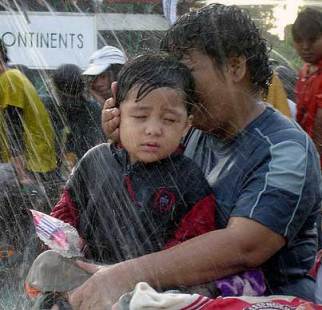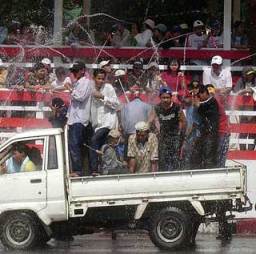Water on the Brain, and Everywhere Else
By Stephen Brookes in Yangon • for Asia Times
________________________________________________________________________________________
On Friday, four days of hell will break loose in Yangon. Either that, or four days of wet, raunchy, non-stop animal fun. How you see it depends on how old you are -- and how much pent-up hormonal aggression is pulsing through your veins.

Photos by Min Zaw Mra Because on Friday, the annual water festival known as Thingyan begins -- a prelude to the start of the Myanmar new year on April 16. For most people, it's the most important festival of the year, a traditional celebration for washing away the sins and bad luck of the previous year.
And many people celebrate it with great dignity. In the countryside, villagers will approach you with a smile and gently pour a ladle of cool, perfumed water over your head -- a kind of peaceful benediction.
But in the cities, you better run for your life -- or someone with a seriously bad attitude will try to annihilate you.
Sensible people either leave town, or gather up their daughters and bolt the doors. Because Thingyan serves as a pressure valve for this highly-controlled, ultra-repressed society, and is the one time in the year when people can abandon their inhibitions, let loose a primal howl and get in touch with their anger, as the headshrinkers say.
The catalyst for the resulting mayhem is water -- oceans of it. Huge stages called pandals are set up all over the city, manned by hose-bearing women who spray passers-by with jets of ice-cold water. To the throbbing beat of heavy metal bands, people roam around in the backs of pick-up trucks nourishing themselves on Mandalay Beer, screaming like animals and getting as wet as they possibly can -- until they're reduced to sodden, incoherent lumps and have to be wheelbarrowed home.
Sounds like fun, right? Listen to the advice of Saw Myat Yin, author of the very useful and sober-minded book, "Culture Shock: Burma."
"One should not only be careful of getting hurt from very rough water throwing, but should be wary of pickpockets in the crowd," she writes. "Ears should be kept well covered with thick towels to avoid injury. Eardrums have been known to be pierced by water prayed at high pressure ... traffic accidents are common ... water throwers try to get rid of their grievances and aggression at this time."
Last year, rumor has it, six people had their eyes put out from water balloons.
To some observers in Yangon, the wildness of Thingyan is only natural. The military government allows few opportunities for self-expression, and none for rebellion or dissent. Any dispute with the authorities ends with: "Because we're the government, that's why -- now go to your room." And with Myanmar's young people chomping at the bit, the government has been issuing stern instructions on the correct way to enjoy themselves, i.e. "to celebrate the festival in accord with Myanmar traditions and to enable the people to have fun in proper manner during the festival, to be refreshed after the festival for discharging duties with full vigor in the new year and to preserve Myanmar traditions."
You get the idea.
Last week, Brig-Gen Khin Maung Than -- whose title is "Commander of the Yangon Command" -- addressed a meeting of the Water Festival Discipline Committee (yes, there is such a thing), where he declared that "punishment will be meted out to those who use unclean water, ice packs and water balloons injurious to others," and warned against drunkenness, "counterculture modes of dress," and "attempts to exploit the festival for political gain and incitement."
He also noted that 42 special courts will be set up in townships to pass sentences should criminal cases occur during the festival. (In case you're wondering: the penalty for throwing a water balloon is three years in the slammer.)
Now, "exploiting the festival for political gain" -- living in Yangon, you get used to that kind of language. The government is forever warning in the official media about the need to fight enemies of the state, and to beware of "neo-colonialists" who would foment social dissolution. It's clearly a warning to supporters of dissident Aung San Suu Kyi not to get any ideas about turning Thingyan into a political event.
But what's interesting about the water festival is the apparent collusion between the people who are acting out their aggressions by violently throwing water, and their willing victims. They coexist in a brutal psychological balance which seems to be satisfying and cathartic for both sides.
"Thingyan is when Yangon's masochists and sadists get out in the streets and feed on each other," explained one diplomat. "We've decided to go to Cambodia until it's over."

Thingyan in Yangon That dominant/submissive relationship could point to some interesting insights into the politics of control in a military state. But it may actually have more to do with sex.
"Thingyan is a very erotic time for young people," a Myanmar friend in her forties explained. "They don't have many opportunities to meet, and really, they hardly know what each other looks like. Underneath, I mean. But everybody's soaked during the festival, so they can all have a good look." She paused thoughtfully for a moment, and added, "There are always a lot of sudden elopements right afterwards."
And there's also the interesting way that the fluids are exchanged, so to speak. During Thingyan, both boys and girls throw water on each other. But generally it's the girls who take the aggressive role: The boys are driven around passively in the backs of pickup trucks shouting obscene comments at women in the street, while the girls turn the hoses on them and spray.
Hmm.
But the most intriguing new development in Thingyan, say some longtime residents, is its growing commercialism. While many of the pandals are still sponsored by government agencies and community organizations, many more belong to companies -- and the biggest are raucous, three-dimensional, live-action advertisements for cigarettes and beer.
And these pull out the stops, hiring rock bands, smoke machines, famous actresses to handle the hoses -- the whole bit. Their pandals are true extravaganzas. So much so, apparently, that some of the government ministries are getting a bit jealous -- and fighting back in the best way they know.
"One of the ministries just informed us we can't use the rock band we had hired -- they want it for themselves," one advertising executive in Yangon told me, rolling his eyes. "So we're being allowed to hire another rock band, but get this -- they're telling us that the band has to play traditional classical music!"
References (2)
-
 Response: celebrity networth
Response: celebrity networth -
 Response: https://bit.ly/onebetasia_lp2stephen brookes - commentary - Water on the Brain, and Everywhere Else
Response: https://bit.ly/onebetasia_lp2stephen brookes - commentary - Water on the Brain, and Everywhere Else


Reader Comments (1)